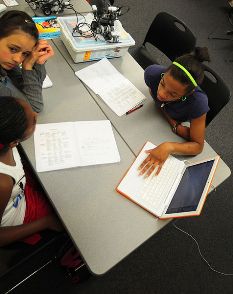Archive for June, 2011
Should local Councillors be given iPads?
It’s a good question that tells us a lot about some of the bigger issues in local government.
 The London Borough of Havering are doing it, and the argument for this is that it will cut printing costs. The good people at one of my favourite blogs We Love Local Government have done some sums:
The London Borough of Havering are doing it, and the argument for this is that it will cut printing costs. The good people at one of my favourite blogs We Love Local Government have done some sums:
“…over that four month period, on average, the Council spent £398.48 per month to provide 17 printed copies of the Cabinet Agenda to the Councillors. This, I think, means that in a year the Council could be spending £4383.28 on Cabinet agendas”
So. For the sake of argument, with no bulk discounts, 17 iPads at £400 a pop (the lowest priced option with only WiFi & no 3G – lets assume that there’s one or two WiFi signals available in the Council chamber!) comes to £6,800. The £500 option (with 3G)? No problem – that’s £8500 for 17.
So assuming they don’t all lose or break them, and assuming they can all actually get them to work in the first place, we’re looking at an idea that will be in the black after six months or so.
This also assumes no productivity savings and no efficiency gains. It assumes that there is going to be no positive cultural shift and that using a new medium will add nothing to the capacity of councillors to use a new medium in new ways – to improve their representative skills. I’ve spent long periods of time working with Councillors on their use of online communications tools and the two biggest obstacles we kept hitting were this utilitarian approach to kit and training, and (or course) the outdated rules on use of communications tools for political purposes.
For me, it’s a slam-dunk. Place the order now! However, WLLG still aren’t totally comfortable with the idea and have four observations at the end of the post: Read the rest of this entry »
Data, visualisation and the talking cure for local government
Toby Blume – my co-host of the session on data visualisation at Local Gov Camp (last Saturday in Birmingham) – has posted his observations from the session here. In addition, Nick Booth has been busy with two posts on the subject.
A few standout quotes: Firstly, here’s Nick:
“…there’s a false expectation that visualising data is easy. The JFDI attitude prevalent in other areas of digital tools for local government may have created false expectations on ease of access to visualisation.
Other digital tools in the social web made for publishing content – such as free blog platforms, Twitter, Facebook Pages or sharing video on YouTube – are relatively straightforward to get started with and local authorities are using these tools to great effect already.
But ease of access to tools, having the ability to publish or the skills to find your way around a blog platform doesn’t necessarily mean you can communicate effectively. Also, you can’t learn to write well or communicate with other people by spending an afternoon reading blog posts on the subject. These are skills that take time to build up and are achieved through practice, experimentation and, frankly, well… work or experience.
Making an effective data visualisation of a civic issue or communicating policy ideas visually to help other people understand the issues is an involved process…”
And Toby brings something else to the table here that slightly jars with Nick’s line:
“Data visualisation is very different to policy visualisation – using data presents all sorts of particular issues and challenges, relating to how you collect and manage data, design and communication skills, corporate culture and practice and purpose.
Policy visualisation – that is, presenting policy in a more visual and accessible way – is, I think, simpler to do. It’s about communicating potentially complex information in a friendlier and more inclusive way. It is helpful to bring good quality design skills to the process, but it’s not essential (at least my experience suggests this is the case – given the positive feedback I’ve had, despite being a design novice).
As important as the end product (ie the visualisation) is the deliberative process of exploring the issues and ideas, reflecting different perspectives and ultimately increasing understanding of the issue [my emphasis]. This is consistent with the learning from Visualcamp – that bringing together designers, policy makers and practitioners (or ‘users’) and arming them simply with pieces of paper and pens, the process of developing a visualisation led to a rich and open discussion about the policy in question.”
If there’s an argument here (and to be fair, there probably isn’t), I’m with Toby. This is not about corporate communications – it’s about the process as much as the outcome. It’s also about the small-p politics of the thing, as I outlined in this post on my work-blog the other day. This is something that councils should be wanting more of.
Sure – there’s a place for a really professional description of the problem as a conversation starter – my friends at ThinkPublic do this beautifully.
But it’s not a professional-doing-it-properly vs social-media-bootstrapping opposition here.
It’s the thing that we often forget about what the blogosphere has brought to public life. We focus – understandably – on the noisy activist bloggers who’ve done big game-changing things (Guido / Taxpayers Alliance = anti-politics, Liberal Conspiracy = new convened voice for the left, MyDavidCameron & 38 Degrees = social-media-as-campaign-vehicle, etc). The sociology of the Westminster Village may be different (even worse?) as a result.
But there’s another dimension. The blogosphere – in it’s widest incarnation – is also a low level conversation. It’s another dimension to the conversational politics question that I posted on earlier today. A talking cure in which issues are discussed and (I beleive, but can’t prove) participants rationalise and learn. Bloggers make new contacts and synthesise new ideas more quickly. And (my personal motto), ‘I write because I don’t know what I think until I read what I say.’ (OK, disclosure: that’s Flannery O’Connor’s line).
Getting school pupils to think about what information is available and how it helps them to describe what government is brings us into the realms of co-creation and co-design. We learn thing we didn’t know -
and we’re asking people to describe the problem rather than getting unelected people to tell us what the solutions should be.
It’s playful. It’s educational (for all concerned). It’s also less problematic from a democratic point of view.
I’ll conclude here by re-posting the conclusions people drew from the session (they were buried at the back of the slideshow last time) – I think they’re a good roundup.
- Review required skills for LocalGov employment
- Co-ordinate visualisation skills within local government better
- Lower expectations on corporate style – go for authenticity rather than branding
- Encourage people other than formal employees to present information – it’s more authentic – enable and curate rather than ‘just create’
- Make a clearer link between participation and decision making
- Make organisations more permissive in comms terns – making everything go through the corporate filter doesn’t work
- When we inform – say WHY we’re informing
- Curate walk-throughs of how people do good data visualisation – dotgovlabls/skunkworks
- Visual media surgeries!
Conversational politics, and how we argue ourselves into positions
I started to write a second follow-up post on the Local Gov Camp data-visualisation session (I’ll probably finish it later today) when I stumbled on this post on conversational politics (in a very wide sense of the term) from my favourite US blogger – it made the point I was inching towards better than I could:
“It turns out (from a study of ethics rather than our topic, politics) that people “have a hard time offering an account of their moral reasoning that contains consistent substantive content.” They are “largely incapable of articulating their moral decision-making process in substantive, propositional terms.” Often, their responses to open-ended questions are rationalizations of what they have done, not reasons that will guide what they do.”
A couple of weeks ago, I posted here on some of the thinking that casts doubt on the suitability of voters to …. er … vote – a sort of briefing for a ‘devil’s advocate’ – and I’ve been looking for way of articulating any of the powerful reasons why the political process matters.
Do read the whole post because it’s very interesting on the way we respond to multiple choice questions and how easy it is to predict our conclusions. But something else occurs to me.
Peter concludes:
“We ought to give good reasons to justify (or criticize) our own actions. We should be interested in other people’s reasons and their reactions to ours. The act of interpreting the public thoughts of working-class urban youth thus has a moral motivation, even if those reasons are not strongly influential in their own lives. I don’t think that current psychological research precludes the hope that good arguments can change people’s implicit stances or premises, which then affect their behaviors.
In short, we should strive to understand other people’s arguments in case they are right and to decide how to respond effectively if they are not.”
Surely there’s a bigger opportunity than understanding how people articulate and assert their political preferences? I’m really interested in the way that people go beyond this and collectively describe the problems that they face – particularly ones that aren’t well-trodden arguments that have gone mainstream. It’s one step further away from the politics that Peter is writing about – but currently one that is monopolised by the small number of social forces that shape our perceptions and define our options so effectively.
Can’t think of a word for that collective entity – can I just refer to it as Babylon seeing as I’ve got Bob Marley playing in the next room at the moment?
Filming council meetings – for and against
Someone (not sure who) has set up a Wrangl board on the pros and cons of filming council meetings. Have a look!
Local Gov Camp session on what data visualisation is for
I spent Saturday at Local Government Camp in Birmingham – there’ll be at least one post along here shortly based on things I learned there. But this one is here to host the slides I used at the start of the conversation (sorry – Slideshare is being a complete pain today and I can’t embed the slides for some reason):
Along with @tobyblume, I initiated one that was intended to be on data visualisation and how schools could be more effective partners in this. It was based on the idea posted here the other day.
We kicked off the session identifying what visualisation is intended to achieve – at least in democratic terms (the slides – above – are based on this post that I wrote for my business blog) – and in the end we didn’t get much beyond this issue and it’s implications for local government’s corporate culture, but I think that the observations that came out of it were very useful indeed.
The conclusions the group reached can be seen on the final slide. I’d be interested to know if you think that there are any obvious lessons that we missed?
Towards a local authority-wide schools data-hack project
 It’s a regular theme of this blog that transparency and open data – while undoubtedly being good things – can often create situations in which democracy is diminished rather than enhanced.
It’s a regular theme of this blog that transparency and open data – while undoubtedly being good things – can often create situations in which democracy is diminished rather than enhanced.
The other day, for example, I posted my misgivings about guerilla webcasting of council meetings. (Shorter version: can result in selective reporting, poorer press coverage and increased power for small heavy-preference pressure groups – boo!)
Looking at it from the point of view of a local authority (particularly the communications team as well as the councillors) transparency and open data seem to have created a situation where the amount of time spent dealing with the angriest local residents goes up.
That the armchair auditors – far from being constructive partners – are non-neutral political activists [this post makes this case in more detail] who are selectively disrupting the aspects of the local authority’s work that they don’t like. Read the rest of this entry »
Council meetings – blogging and web-casting
The news that a blogger who filmed a meeting of a local council in Carmarthenshire was arrested for “breaching the peace” raises an interesting question that could have a slightly unfashionable answer.
My friend, David Allen Green, writing in the New Statesman has a supplied a detailed trawl of the legal evidence along with some good journalistic legwork to conclude that…
“…Carmarthenshire Council and Dyfed Powys Police have simply acted in an altogether hapless, illiberal, and alarming manner. A person, surely, should not be arrested and detained just for filming a public council meeting, and a council should not be able to prevent someone from doing so in this manner. In my opinion, all the councillors, officials, and police officers involved in this sad sequence of events really should be ashamed of themselves.”
I’m in two minds over whether the flip-cam will improve the quality of local democracy, and I think this highlights some of the tension between liberalism and the good practice of liberal democracy.
On the one hand, all of David’s arguments stand – and then some. Surely a good democracy should remove any barriers that stop people from viewing democratic proceedings? Transparency will result in less corruption, better decisions, a greater sense of participation, and so on. Read the rest of this entry »
Democracy and optimal policymaking – a few signposts
This is a bit of a rehearsal of the ‘what is a good government – and is it democratic? question. It’s also more of a set of bookmarks than a proper post, but I hope someone finds it useful.
I think we would all like to find ourselves in a situation where the public – by voting – get a government that delivers The General Will – and that, by this, we understand that it does it efficiently as well.
If someone could demonstrate that we could have this without votes or public participation, we’d have to face a tough question: Do we actually want a democracy at all?
So, for example, take the notion of The General Will. As an example, lets take something that the public have a settled preference on. For example, lets say (for the sake of argument) that we want everybody to be able to have access to, and the ability participate in, a particular activity – no matter what their social or ethnic status may be. This will not just require rules to prevent discrimination – it will also require society to be organised in such a way as to make it possible for someone to provide such a service.
The example that springs to mind is that of a golf club.

